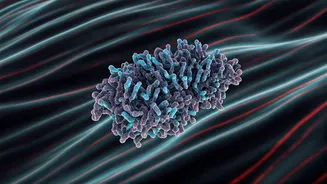The Sugar Myth
Dr. Pal, a specialist in gastroenterology, contends that the widespread belief that sugar is the main cause of diabetes might be misleading. He clarifies
that while sugar intake is a factor, it's not the primary one. According to Dr. Pal, the focus should shift to the underlying mechanisms. The physician believes that to truly understand the dynamics of diabetes, one must look beyond sugar consumption and examine the processes that lead to insulin resistance, a condition where the body's cells don't respond effectively to insulin. This response causes an increase in blood sugar levels, which is a symptom of the disease rather than its origin. His viewpoint encourages a deeper investigation into the complexities of the metabolic process.
Insulin Resistance Unveiled
The main point made by Dr. Pal is that insulin resistance is at the heart of the matter. This condition represents the body's cells becoming less sensitive to insulin, a hormone pivotal in regulating blood sugar. When cells do not respond as they should to insulin, glucose remains in the blood, leading to elevated blood sugar levels and the subsequent development of diabetes. Dr. Pal emphasizes the intricate nature of this issue, illustrating that it is not a consequence of mere sugar consumption but the result of deeper metabolic disorders. He points out that insulin resistance often progresses silently, with individuals unaware of its presence until it has considerably advanced. This emphasizes the importance of understanding the causes and recognizing early warning signs to manage the condition before it progresses.
Lifestyle Triggers
According to Dr. Pal, several lifestyle factors contribute to the onset of insulin resistance. He mentions the negative impact of poor sleep, which disrupts the body's hormonal balance and metabolic function, making it harder for cells to process glucose efficiently. Lack of physical activity is also mentioned, with regular exercise playing a vital role in enhancing insulin sensitivity. The consumption of processed foods, often laden with unhealthy fats and refined carbohydrates, is also listed as a significant contributor. These foods can exacerbate inflammation and undermine the body's ability to maintain healthy blood sugar levels. Stress, too, is a critical element, as chronic stress can trigger the release of hormones that interfere with insulin's function. In essence, Dr. Pal underlines that a combination of these elements forms a perfect storm that can culminate in insulin resistance and, consequently, diabetes.
Early Warning Signs
Dr. Pal stresses the importance of recognizing early warning signs. He indicates that many people may experience early indicators, like persistent fatigue, which can be an early indicator of insulin resistance and the beginning of metabolic dysregulation. He also mentions sweet cravings as a signal to watch. These cravings could be the body's way of signaling that it's struggling to utilize glucose effectively. Early awareness of these symptoms is crucial, according to Dr. Pal, as they can prompt individuals to seek medical advice and take preventative actions. He emphasizes that detecting these early warning signs allows people to address the underlying issues before significant damage occurs, thereby improving the chances of preventing or effectively managing diabetes. Furthermore, recognizing these signals can prompt an individual to modify lifestyle factors which significantly influence the onset and progression of insulin resistance.



















